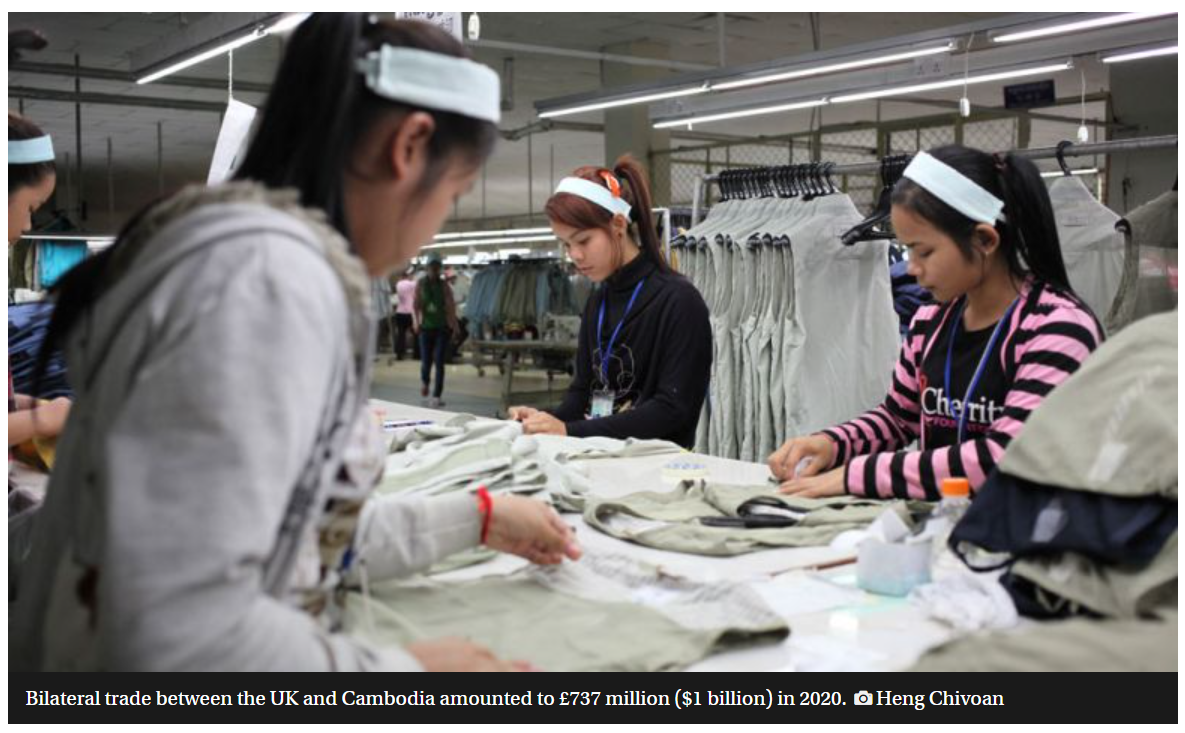Cambodia: Ministry seeks feedback on UK trade rules
Phnom Penh Post – The Ministry of Commerce seeks to engage the involvement of all exporters in the consultation process of drafting a mechanism that will serve as a benchmark for Cambodian commercial exports to the UK.
Following the result of a referendum held in 2016, the UK’s divorce from the EU on January 31, 2020 – commonly known as Brexit – gave Britain the freedom to set an independent trade policy.
The UK government has since committed to increase access to UK markets for developing countries, as Cambodian products gain more support and market share.
The ministry on August 16 said the UK has given stakeholders the opportunity to participate in public consultations on the Developing Countries Trading Scheme (DCTS), which is due to replace the Generalised Scheme of Preferences (GSP) next year.
It noted that a questionnaire is available in electronic format on the UK public sector information website for anyone who wishes to offer input or requests concerning adjustments to export requirements and procedures to streamline the process and ensure it is transparent and inclusive.
The UK government launched the open consultations on the rules and provisions to be incorporated in the DCTS on July 19, in a bid to boost trade with lower-income nations, including Cambodia.
UK embassy in Phnom Penh stressed that the DCTS “is a major opportunity to grow free and fair trade with developing nations”.
“The proposed scheme would apply to 70 qualifying countries currently and include improvements such as lower tariffs and simpler rules of origin requirements for countries exporting to the UK, allowing countries to diversify their exports and grow their economies.
“[The DCTS] will apply to 47 countries in the Least Developed Country Framework [LDCF] and 23 additional countries classified by the World Bank as low-income and lower-middle-income countries,” it said.
Ministry undersecretary of state Pen Sovicheat told The Post last month that Cambodia welcomes any preferential trade system that could benefit market expansion and provide opportunities and greater access for Cambodian goods to the UK.
Cambodia currently receives preferential trade treatment under the GSP, which the UK provides to the Least Developed Countries (LDC), he said, asserting that the facility is essentially equivalent to the EU’s ‘Everything But Arms’ (EBA) scheme.
On August 12, the European Commission – the EU’s executive arm – partially withdrew the EBA scheme from Cambodia. The suspension affects one-fifth or €1 billion ($1.2 billion) of the Kingdom’s annual exports to the EU’s 27-nation bloc.
Sovicheat said: “If the new preferential system is easier to implement under the existing British GSP, we welcome it based on the conviction that we will have more opportunities to expand our market presence in the UK.”
Garment Manufacturers Association in Cambodia deputy secretary-general Kaing Monika lauded the UK’s GSP programme as a policy of great consequence, saying that public consultation is paramount to democratic governance.
He told The Post on August 17: “We will disseminate this info among our members and encourage them to participate in the process and respond to the questionnaire in the given link.”
Sovicheat noted that Cambodia-UK trade logged steady growth over the first five months of this year, reaching a total of $258.45 million during the period, with Cambodian exports and imports to the tune of $239.73 million and $18.17 million, respectively.
The export and import figures add up to $257.90 million, which is $0.55 million short of the trade total provided by the commerce official.
Sovicheat added: “This is a testament to the close and prosperous trade ties between Cambodia and the UK, and there will be more opportunities to expand this market, and trade volume.”
The questionnaire can be accessed until September 12 at www.gov.uk/government/consultations/designing-the-uk-trade-preferences-s…


 English
English




